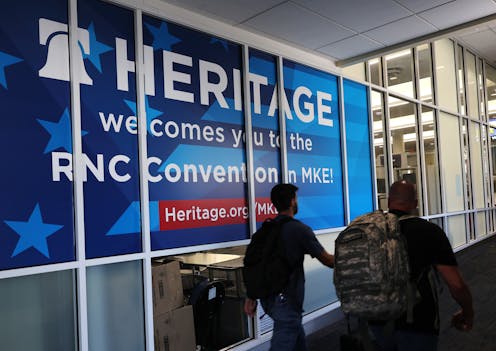Heritage Foundation’s ‘Project 2025’ is just the latest action plan from a group with an over 50-year history of steering GOP lawmaking
- Written by Zachary Albert, Assistant Professor of Politics, Brandeis University
 People walk past a Heritage Foundation advertisement at the Milwaukee International Airport on July 12, 2024.Michael M. Santiago/Getty Images
People walk past a Heritage Foundation advertisement at the Milwaukee International Airport on July 12, 2024.Michael M. Santiago/Getty Images As the 2024 presidential election heats up, some people are hearing about the Heritage Foundation for the first time. The conservative think tank has a new, ambitious and controversial policy plan, Project...

